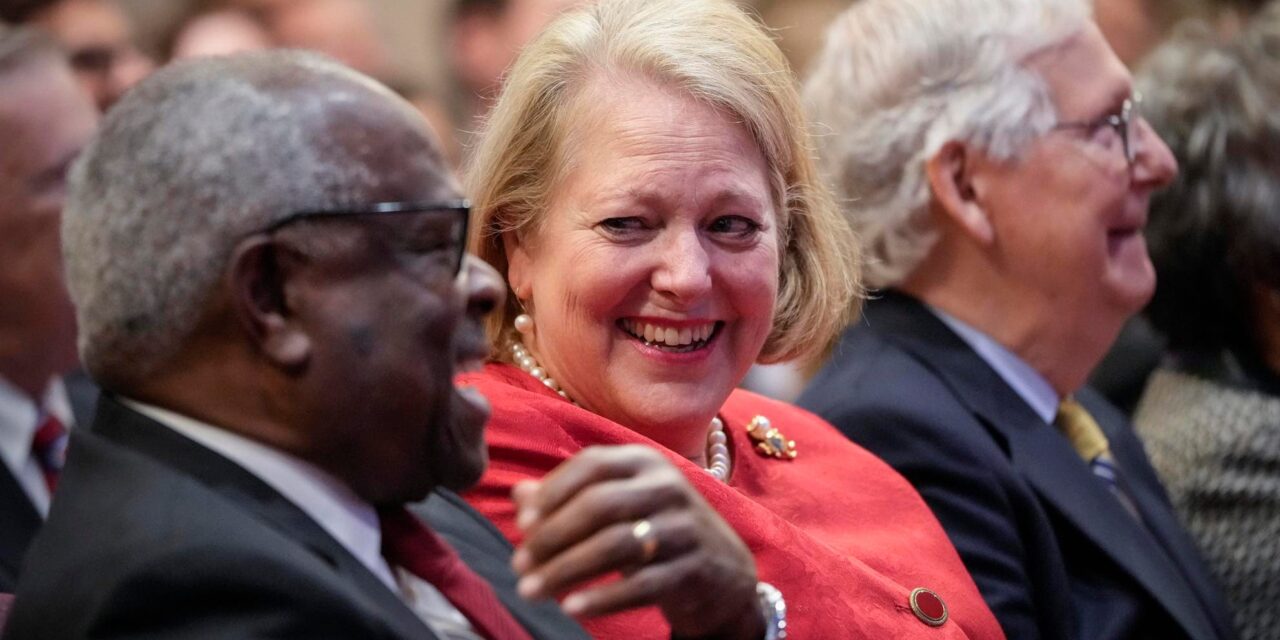As if there weren’t already enough ethical concerns surrounding Supreme Court Justice Clarence Thomas and his wife Ginni, ProPublica has just dropped a bomb, reporting that billionaire Harlon Crow secretly paid for the private school tuition of Thomas’s grandnephew. This isn’t something that can just be brushed aside, so Senate Republicans are asking the Supreme Court to police their own. Their argument, as expressed by Sen. John Cornyn (R-TX) and Mitt Romney (R-UT), is that the judiciary is a separate and autonomous branch of government and it would be unconstitutional for the legislative branch to interfere in their operations. This excuse covers both doing anything directly to Thomas and crafting any bills to clarify the high court’s ethical obligations. It probably also covers asking Chief Justice John Roberts to come to Congress to testify about Thomas’s clear lapses in judgement and conflicts of interest.
But let’s get something clear. As the White House website helpfully explains, the Constitution gives Congress a big say in how the judiciary is organized and how it functions.
Article III of the Constitution, which establishes the Judicial Branch, leaves Congress significant discretion to determine the shape and structure of the federal judiciary. Even the number of Supreme Court Justices is left to Congress — at times there have been as few as six, while the current number (nine, with one Chief Justice and eight Associate Justices) has only been in place since 1869. The Constitution also grants Congress the power to establish courts inferior to the Supreme Court, and to that end Congress has established the United States district courts, which try most federal cases, and 13 United States courts of appeals, which review appealed district court cases.
The Constitution gives the Senate responsibility for vetting and confirming judges, and it gives the House of Representatives the authority to remove them from office through the use of impeachment. As with the presidency, any impeachment in the House is followed by a trial in the Senate. Since these are lifetime appointments, the only way to remove a federal judge is through a Senate conviction.
Federal judges can only be removed through impeachment by the House of Representatives and conviction in the Senate. Judges and Justices serve no fixed term — they serve until their death, retirement, or conviction by the Senate. By design, this insulates them from the temporary passions of the public, and allows them to apply the law with only justice in mind, and not electoral or political concerns.
Eight times, the Senate has voted to convict and remove a federal judge, so this isn’t common but it also is far from unprecedented. In 2010, Judge Thomas Porteous of Louisiana was ousted for “signing false financial disclosure forms under oath,” thus concealing “cash and things of value that he solicited and received from lawyers appearing in litigation before him.” That sounds a lot like failing to divulge that a billionaire is paying for a family member’s $6,000/month tuition, providing sweetheart real estate deals and providing “international superyacht cruises and private jet flights around the world.” The votes against him on four separate counts of impeachment were unanimous. The Senate vote disqualifying him from ever holding or enjoying “any office of honor, trust or profit under the United States,” was 94-2. On a side note, his lawyer was Jonathan Turkey and one of the votes to acquit came from Joe Lieberman.
Porteous was nominated to the court by Bill Clinton, but the Democrats did not rally to his side or make excuses for his behavior. They didn’t say that it was up the judicial branch to police their own. Everyone understood that corrupt federal judges can and must be removed by Congress, just as the Constitution envisions. Thomas’s billionaire benefactor, Harlow Crow, had substantial interests before the Court, and plenty of reason to believe Thomas would protect those interests. This is why Thomas was required by law to disclose these gifts.
A federal law passed after Watergate requires justices and other officials to publicly report most gifts. Ethics law experts told ProPublica they believed Thomas was required by law to disclose the tuition payments because they appear to be a gift to him.
As was the case throughout Donald Trump’s presidency, here we have another example of a federal employee who is in blatant violation the law, and we’re told that neither the Justice Department nor Congress should do anything to do anything about it.
And the question is, “why?”
Why should Clarence Thomas remain on the Supreme Court?
There’s no valid answer.







